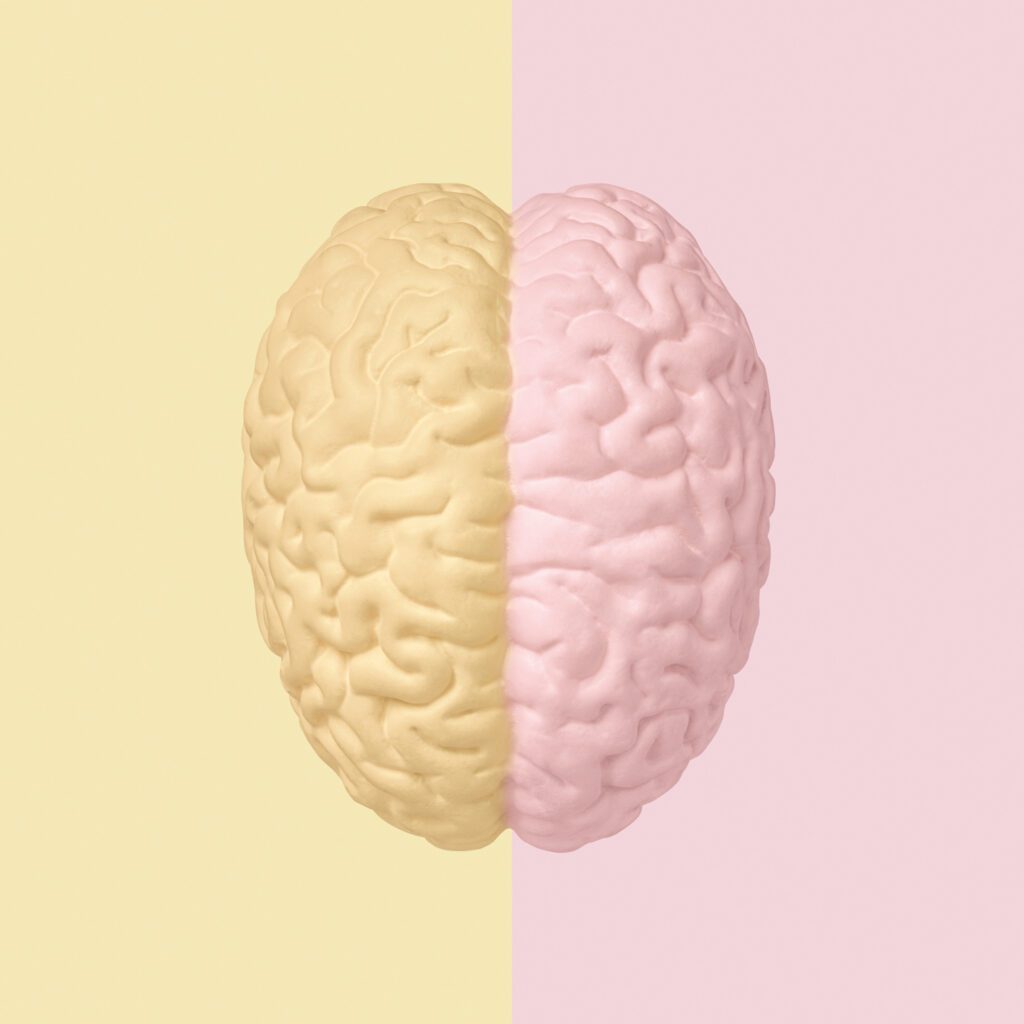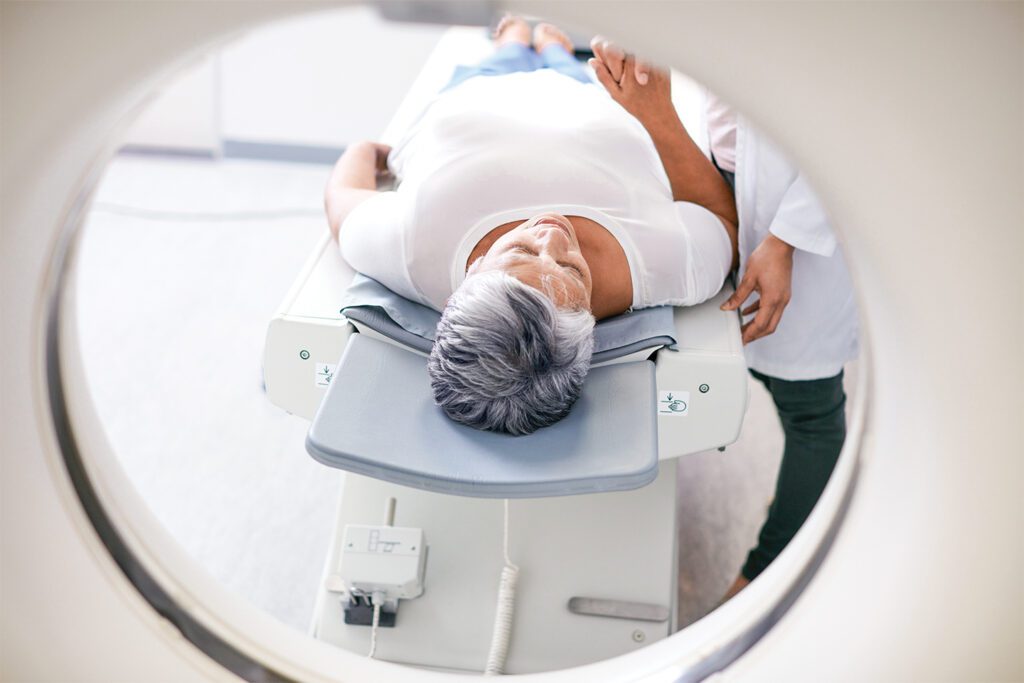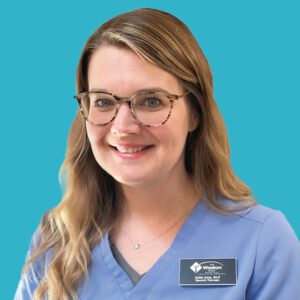Every 40 seconds, someone in the United States experiences a stroke. Roughly a third of these strokes will result in aphasia, or an impaired ability to express or comprehend language, and strokes remain the leading cause of the condition. Here, speech-language pathologists from Siskin Hospital for Physical Rehabilitation, Encompass Health Rehabilitation Hospital, and The Weston Therapy Group share more information about this surprisingly common condition.
What is Aphasia?
Aphasia is an impaired ability to communicate, typically resulting from damage to the parts of the brain that are responsible for language. “Language includes comprehension (understanding what is being said to you) and expression (verbalizing your words, sentences, and thoughts), as well as reading and writing. Aphasia can differ in severity and the specific types of language deficits it causes,” says Daye Click, a speech-language pathologist (SLP) with Encompass Health Rehabilitation Hospital. Aphasia often occurs suddenly after a stroke or traumatic brain injury, but can develop gradually in cases of brain tumors or progressive neurological diseases.
“Aphasia alone does not affect a person’s cognition or intellect. A person with aphasia knows what they want to say, they just cannot get it out,” says Sara Tinter, an SLP and brain injury specialist with Siskin Hospital for Physical Rehabilitation. “A few of my patients with aphasia have described it this way: ‘Mind is there, just can’t speak.’ It is a very isolating disorder.”


To further explain this disorienting experience, Click says, “If someone says ‘what do you want to eat?’ in German and you speak English, it will be difficult to figure out what they are asking, much less how to answer the question. Sometimes, people with aphasia are not aware there is anything wrong with how they are processing language, or that they are having difficulty speaking as they normally would.”
Diagnosis
Aphasia is typically diagnosed by the physician treating a patient’s brain injury. Generally, patients will undergo an MRI or CT scan to confirm the presence of a brain injury and locate which area of the brain is affected. According to Tinter, “The location and size of the lesion impacts the severity of aphasia and in turn, the prognosis. A larger lesion in the language dominant center of the brain can result in more severe aphasia and a more difficult recovery.”
Additionally, the diagnosing physician will evaluate a patient’s ability to answer questions, hold conversations, and follow commands. Patients are then referred to an SLP who will determine what aspects of communication are affected, to what degree they are impaired, and what treatment should follow.
Treatment



Some patients will see dramatic improvements in their aphasia as the injury in their brain heals. However, when symptoms remain after this recovery period, speech-language therapy may be necessary. Aphasia therapy focuses on improving a person’s ability to communicate, and the goals vary depending on the severity of the condition and a patient’s individual goals.
SLPs also offer communication aids, like compensatory strategies and assistive technology. “Assistive devices can be as simple as a piece of paper with two to four pictures on it, which allow the person to point to ‘bathroom’ or ‘drink.’ This could also be a dry erase board or a piece of paper with letters and numbers on it,” Click explains.
“Higher level assistive technologies are also available as apps on your phone or tablet. Many of these apps are sophisticated, with various levels of vocabulary and syntax to help people effectively communicate with friends and family.”
Family support is another important factor in aphasia therapy. “Depending on the severity of aphasia, it may be difficult for a person to express their goals, wants and needs, or medical history. This can cause frustration, feelings of discouragement, and a lack of motivation,” Tinter says. “I often ask family members to compile patient information such as family members’ names, the personʼs hobbies, relationships, responsibilities, likes, and dislikes. This helps them to feel understood and motivated, and it also helps me create an individualized therapy plan to address their personal goals.”
Motivation can make all the difference, according to Click. “The more a patient is motivated to work in speech therapy sessions, the more they complete their homework, and the more they practice and talk with their family, the easier it becomes for them to communicate,” she says.
Advice For Loved Ones and Caregivers
If your loved one is experiencing aphasia, you probably have a lot of questions. Luckily, we have some answers.
How can I make sure my loved one’s needs are being met? Working directly with the SLP who is treating your loved one is a great place to start. Julie Ana Boozer, an SLP with The Weston Therapy Group at Morning Pointe Senior Living, explains “There are many communication strategies and techniques that may be appropriate to use while caring for your loved one with aphasia. Communication strategies and technique are patient-specific, so speak to the SLP treating your loved one in order to determine most beneficial strategies.”



Can I assist in my loved one’s recovery from aphasia at home? Overall, you can encourage them to stay motivated by including your loved one in conversations and gatherings, as well as celebrating their wins – big or small. Incorporating therapy practices into a patient’s home life can also be very beneficial. “Research shows that supplementing in-person therapy with at-home therapy can help facilitate recovery. Talk to the SLP treating your loved one about activities you can do at home. There are also a variety of tablet applications that may benefit your loved ones outside of therapy sessions,” Boozer advises.
If my loved one lives in an assisted living facility, will this impact their recovery? “Assisted living facilities (ALFs) provide a setting that promotes socialization as well as builds trusting relationships with others, which is important for treatment and recovery. ALF caregivers can help navigate the challenges a resident with aphasia may face. Engagement with others is important, and ALFs offer many opportunities for group activities in addition to shared meals,” Boozer says. “Another benefit to residents is access to on-site resources, such as therapy teams with SLPs, which make it easier to take advantage of services that may not be as accessible for individuals living independently.”
Here are 10 tips for communicating with a person experiencing aphasia:
- Minimize background noise and get their attention before speaking
- Speak to them like an adult, but slow down and use simplified sentences
- Do not speak in an elevated tone
unless requested - Give them time to respond and avoid interrupting
- Supplement words with nonverbal communication, gestures, and writing
- Use “yes or no” questions to confirm that information is being understood
- Be encouraging, and don’t insist on perfect pronunciation
- Include them in family conversations and activities
- Avoid overloading them with
irrelevant information - Encourage independence and avoid being overprotective



Sara Tinter, M.S. CCC-SLP CBIS
Speech-Language Pathologist and Certified Brain Injury Specialist, Siskin Hospital for Physical Rehabilitation



Daye Click, M.S. CCC-SLP
Speech-Language Pathologist and Speech Therapy Team Leader, Encompass Health Rehabilitation Hospital of Chattanooga



Julie Ana Boozer, M.S. CCC-SLP
Speech-Language Pathologist, The Weston Therapy Group, a Morning Pointe Medical Partner

